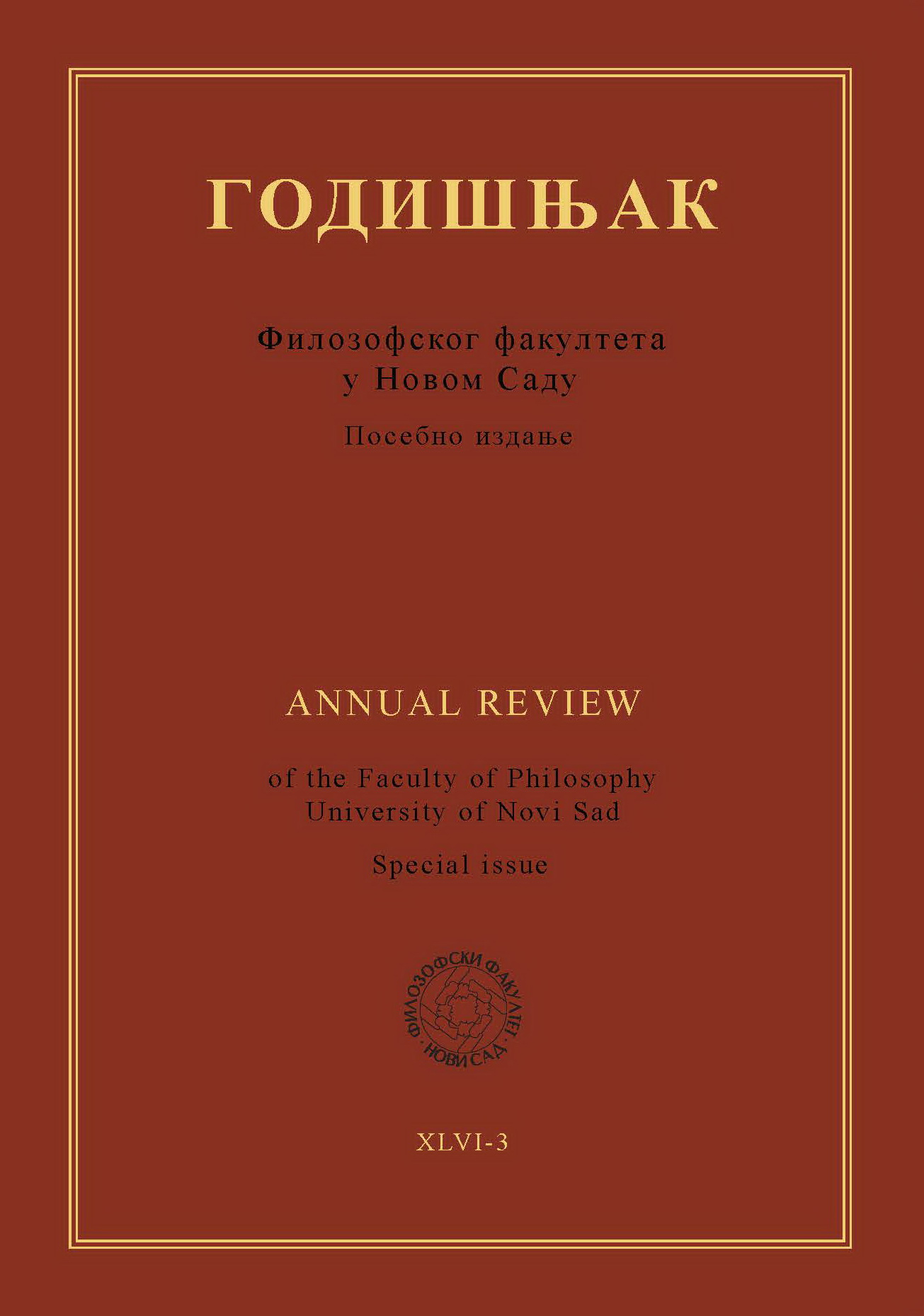INTERTEXTUALITY AND MODERNITY IN THE COMPANIONS OF ISIDORA SEKULIĆ
Main Article Content
Abstract
In this paper we will consider the presence of poetics and aesthetics of the evil and damnation respectively, typical for the French « damned poets », as well as the presence of the modern, avant-guard spirit in the Companions of Isidora Sekulić. By carrying out a comparative and intertextual analysis, firstly we will gradually discover a whole series of harmful but creative poetic images in Isidora Sekulić’s work; these images draw their origins from black and grotesque romanticism (Hugo, Nodier, Sue, Nerval), then from Baudelaire and his « terrible » successors like Rimbaud and Lautréamont. In addition to this funeral imagery, we will also recognize plastic images of a physical illness, worthy of the realism or « clinical » naturalism of Zola and his successors. Secondly, we highlight the modern spirit of the Companions. This collection was published in 1913, the same year in which Guillaume Apollinare’s Alcools appeared. The collection of prose fragments is the first work of the Serbian writer and at the same time represents a real breath of modernity just like the famous collection of poems by Apollinaire. It is in the context of antitradition and the modern spirit that we bring close the poetry of the French poet and the prose fragments of the Serbian writer. In her « short prose poems » Isidora Sekulić was able to recreate, poetically, her own experience of physical and moral pain. The end goal is to show the depth of Isidora Sekulić’s poetic genius communicating, in an underlying but intense way, the earlier spirits who lived and died under the evil sign of the « Black Sun ».
Downloads
Article Details

This work is licensed under a Creative Commons Attribution-ShareAlike 4.0 International License.
References
Apollinaire, G. (2019). Alcools. Morhange-Bégué, C.–Lartigue, P. (réd.) (2019). Paris : Hatier.
Baudelaire, Ch. (2019). Les Fleurs du mal. Paris : Hatier.
Baudelaire, Ch. (1920). Journaux intimes. Paris : G. Crès et Cie. Disponible sur https://gallica.bnf.fr/ark:/12148/bpt6k206339d/f64.item.r=mon%20coeur%20mis%20%C3%A0%20nu
Baudelaire, Ch. (1869). Petits poèmes en prose. Paris : Michel Lévy frères.
Bertolino, N. (1991). Fenomen Rembo. [Phénomène Rimbaud]. Beograd : Nolit.
Bjelić, N. (2019). Le motif du pont dans la poésie française (Hugo, Rimbaud, Apollinaire). Facta Universitatis, series Linguistics and Literature, vol. 17, No2. Thematic issue : Radivoje Konstantinović, professeur, traducteur, polyglotte. Niš : University of Niš. 299–307. DOI: https://doi.org/10.22190/FULL1902299B
Brunel, P. (2007). Baudelaire – antique et moderne. Paris : Presses de l’Université Paris-Sorbonne.
Carlier, M.-C.–Couprie, A.–Dubosclard, J.–Erre, M.–Eterstein, Cl.–Jacques, J.-P.–Lesot, A.–Levy, A.-D.–Rachmühl, F. & Sabbah, H. (1988). Itinéraires littéraires. XIXe siècle. Tome II. Paris : Hatier.
Décaudin, M.–Leuwers, D. (1996). De Zola à Guillaume Apollinaire (1869–1920). Paris : Flammarion.
Delon, M.–Mélonio, F.–Marchal, B.–Noiray, J. & Compagnon, A. (2007). La littérature française : dynamique & histoire. Tome II. Paris : Gallimard.
Fridrih, H. (2003). Struktura moderne lirike. [Structure de la poésie moderne]. Novi Sad : Svetovi.
Kristeva, J. (1987). Soleil noir. Dépression et mélancolie. Paris : Gallimard.
Lautréamont, Isidore Ducasse, comte de. (1869). Les Chants de Maldoror. Bruxelles : Lacroix et Verboeckhoven et Cie. Disponible sur https://www.ebooksgratuits.com/pdf/lautreamont_chants_de_maldoror.pdf
Marić, S. (2010). O Rembou i Lotreamonu. [Sur Rimbaud et Lautréamont]. Beograd : Službeni glasnik.
Peković, S. (2009). Isidorini oslonci. [Appuis d’Isidora]. Novi Sad : Akademska knjiga.
Picoche, J. (2006). Dictionnaire étymologique du français. Paris : Le Robert.
Rimbaud, A. (1886). Illuminations. Notice par Paul Verlaine. Paris : Publications de La Vogue. Disponible sur https://gallica.bnf.fr/ark:/12148/btv1b8610832j/f42.item
Sekulić, I. (1995). Saputnici. [Compagnons de voyage]. Beograd : Plavi jahač.
Skerlić, J. (2006). Istorija nove srpske književnosti. [Histoire de la nouvelle littérature serbe]. Beograd : Zavod za udžbenike.
Udovički, I. (1977). Esej Isidore Sekulić. [L’essai d’Isidora Sekulić]. Beograd : Institut za književnost i umetnost.




